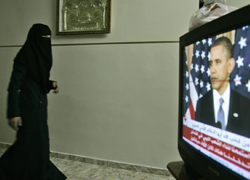Panalists Dr. Paul Williams, a Professor at American University, Lt. Col. Rachel VanLandingham of the United States Air Force, and Dr. Robert Hazan, a Professor at Metropolitan State College of Denver discussed the international and U.S. policy implications of the Arab Spring in a late afternoon panel of the Sutton Colloquium. Dr. Williams started off the discussion with remarks about the U.N Security Council Resolution 1973 (“Resolution 1973”) that allowed for a no-fly zone over Lybia and authorized all necessary measures to protect civilians. Dr. Williams compared Resolution 1973 to previous unsatisfactory action taken in Bosnia, Darfur and Rwanda. Unlike previous humanitarian intervention efforts, Resolution 1973 could serve as a clear legal blueprint for future humanitarian intervention.

Lt. Col. VanLandingham noted that Resolution 1973 strengthened the view that abuses in one country can affect global security and underscored the willingness of states to intervene to protect civilians. She also stated that although Resolution 1973 was not a “reigning vindication” of the Responsibility to Protect Doctrine (“R2P”), it brought the doctrine closer to a binding legal norm. Dr. Hazan stressed the importance of the U.S. and other like-minded nations being part of the humanitarian movement. However, he also cautioned that now is the time for states to engage in active discussions regard humanitarian intervention. Given the current state of the global economy states may find it more difficult to provide humanitarian aid in the future.
This cautionary language begs the question: how should a state balance the needs of its own citizens with the Responsibility to Protect and humanitarian aid and intervention. As mentioned by Dr. Hazan, as the economic state of the Eurozone worsens and the U.S. economy continues in its state of instability, international humanitarian aid may take a backseat to domestic concerns. By way of example, several U.S. polls found that a majority of Americans favor cutting foreign aid over other spending cuts. It should be noted, however, that the percentage of the budget that is spent on foreign aid is miniscule in comparison to the expenditures such as healthcare and defense.
Resolution 1973 arguably brought R2P closer to a binding legal norm, however, R2P is a narrow doctrine limited to mass atrocities and implemented multi-laterally, i.e. via a Security Council Resolution. In its international sense, R2P focuses on the responsibility of States to halt and prevent “mass atrocity crimes” (war crimes, crimes against humanity, ethnic cleansing and crimes against humanity). If the situation in a state does not rise to the level of a mass atrocity, assisting States may not be as likely to intervene absent a Security Council Resolution or other political pressure. States, however, should be cautious about withholding humanitarian aid in light of the notion that, as noted by Lt. Col. VanLandingham, abuses in one country can certainly impact global security. Regardless of whether a state’s citizens are put in immediate danger, it should not sit idly by while abuses are committed in a foreign state.
Resolution 1973 can hopefully serve as a blueprint for future action. As President Obama stated, “working in Libya with friends and allies, we`ve demonstrated what collective action can achieve in the 21st century.” A brutal dictator was removed from power without putting any U.S. troops on the ground. Resolution 1973 should serve as a model for future intervention, however, the international community should be weary that humanitarian intervention could be undermined by political pressure to deal first with domestic concerns.


